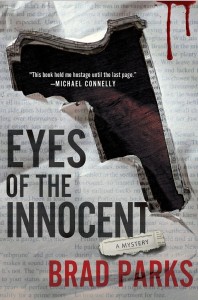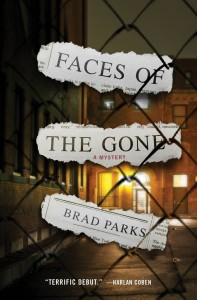by Brad Parks
Today TKZ is thrilled to welcome Brad Parks, reformed sportswriter and award winning author, whose second book EYES OF THE INNOCENT was just released. 
I have this weird thing for dates. They stick in my head for no good reason.
Aug. 5, 1998. The day my pet rabbit, Snowflake, died.
Aug. 20, 1994. The day I first kissed the beautiful woman who is now my wife.
Nov. 5, 2004. The day I finished my first novel-length manuscript (a book that, incidentally, will likely never be published, unless I pull a Stieg Larsen and become unexpectedly famous after my untimely passing).
Feb. 3, 2011. The day I put the entire Kill Zone audience to sleep with the boring biographical details of my tedious life because I didn’t move on with the point of my guest blog post…
… So, right, the point of this post is actually to talk about some of the most significant dates in a writer’s life.
Deadline dates.
Now, that word, “deadline,” can inspire a lot of fear in writers. Its origin – and I swear, I’m not making this up – is actually penal in nature. Once upon a time, a deadline referred to a line in a prison that inmates couldn’t cross, or else they’d be shot dead.
But I’m here to say deadline is actually a wonderful thing for writers, something we should embrace rather than loathe. And I have come to discover there is power and freedom in a deadline, in knowing that you don’t have the luxury to get too picky, in understanding that what you’re aiming for is not “good” but “good enough.”
I first learned this as a journalist. I spent twelve years working for daily newspapers, much of it in the sports department, where the deadlines are unforgiving. I can remember covering Yankees playoff games in 1999, when my editor explained to me they were holding the entire paper for my story – and that each minute the story was late would cost $15,000 as presses and trucks sat idle, racking up gas and overtime.
I didn’t know if he was inventing the number, but I did know I was making about $60,000 a year, so my entire annual salary could slip away in four minutes. And I was guessing it would probably be easier to find another $60,000-a-year sportswriter than paying for the ten minutes it took for me to find that perfect word or phrase for my lede. It tended to have a marvelous, focusing effect on my work, one I carried throughout my journalism career.
But I have also learned to love deadlines as a novelist, and it was because of my latest book, EYES OF THE INNOCENT, which just hit the shelves.
Now, the  aforementioned unpublished manuscript took me three years, writing during the off-season of whatever sport I was covering. The next one? I probably turned that around in a year and a half, writing in dribs and drabs when news was slow.
aforementioned unpublished manuscript took me three years, writing during the off-season of whatever sport I was covering. The next one? I probably turned that around in a year and a half, writing in dribs and drabs when news was slow.
I knew from the start EYES OF THE INNOCENT needed to be a different animal, thanks to deadline. And here, I return to my thing with dates, and some of the ones my brain attached to this book, starting with:
July 8, 2008. The day I learned I would have to write it. I know because that was the wonderful afternoon my agent called to say my manuscript, the book that would later become FACES OF THE GONE, had sold to St. Martin’s Press. She also told me it was a two-book deal, so FACES better have a sequel.
That leads to:
Jan. 27, 2009. The day, according to my contract, that second book would be due.
Now, six months is not an unreasonable length of time in which to write a novel. Heck, there are romance writers out there who can turn one around in six weeks. Except, of course, there were complicating factors.
The first was that we were in the midst of moving three states away, from New Jersey to Virginia. When I got that call from my agent, we were less than two weeks away from the moving vans arriving (July 21, 2008).
The second was that I still had a full-time job as a daily newspaper reporter.
But those were far less important complications than the real deadline then looming in our house around that time:
Dec. 18, 2008. The day my wife was due with our second child.
I knew, from the experience of the first child, that absolutely no meaningful writing would get done for at least six months after the blessed arrival. I also knew, again from Baby No. 1, that my wife would probably go early.
So I had to get to work. I spent a few weeks going over FACES OF THE GONE (it had been roughly two years since I finished it and I needed to re-familiarize myself). Then came:
Aug. 13, 2008. The day I first opened up the file that would become EYES OF THE INNOCENT. Unlike those first two manuscripts, where there were so many stops and starts, I really had to hammer on this one. Deadline and the impending arrival of a baby had given me no choice. And I discovered, much like the days when dilly-dallying cost $15,000 a minute, the pressure had a way of making me concentrate on getting to The End without worrying quite so much about the little stuff along the way. So it was, three months and twenty days later, I got to:
Dec. 3, 2008. The day I turned in a draft to my agent. (And, it turned out, I was just in time – my wife was, once again, about two weeks early).
Is the book any different for having been turned around so quickly? Yeah, it is: It’s better. The pacing, the plotting, it’s all so much tidier. Everyone has their own speed. But I’ve since discovered three months per book is the right one for me. And I have that one tight deadline to thank for the revelation.
What about you guys? Any good deadline stories out there?
Brad Parks’s debut, FACES OF THE GONE, became the first book ever to win the Nero Award and Shamus Award, two of crime fiction’s most prestigious prizes. His second book, EYES OF THE INNOCENT, just released from St. Martin’s Press/Minotaur Books. Library Journal gave it a starred review, calling it “as good if not better (than) his acclaimed debut.” For more Brad, sign up for his newsletter, follow him on Twitter, or became a fan of Brad Parks Books on Facebook.


